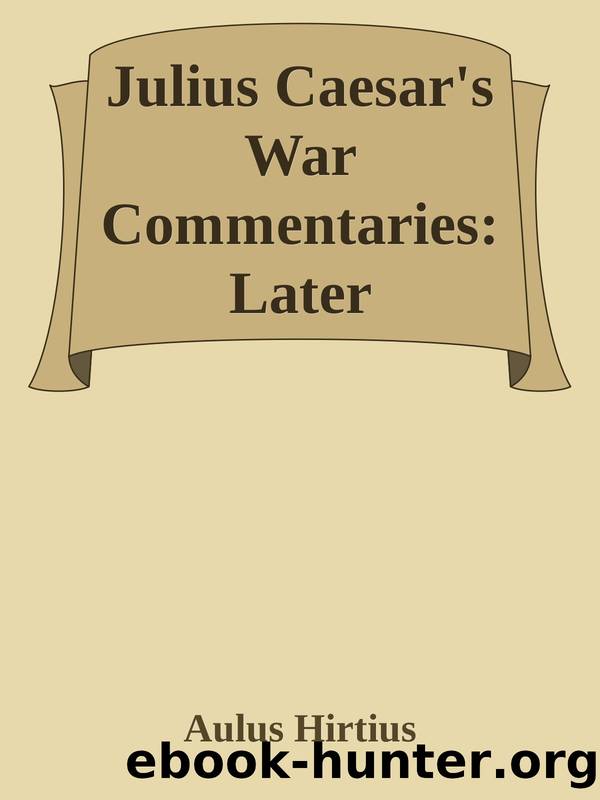Julius Caesar's War Commentaries: Later Campaigns by Aulus Hirtius

Author:Aulus Hirtius [Hirtius, Aulus]
Language: eng
Format: epub
Published: 0101-01-01T00:00:00+00:00
The Spanish Wars
[1]On the defeat of Pharnaces and reduction of Africa, those who escaped from those battles fled to young Cn. Pompey, who had taken possession of Further Spain, while Caesar was detained in Italy in exhibiting games. Pompey began to throw himself on the protection of every state, in order the more readily to establish the means of defense against him. Accordingly, with a considerable force which had been collected, partly by entreaty, partly by force, he began to lay waste the province. Under these circumstances some states voluntarily sent him supplies, others shut the gates of their towns against him. If any of these chanced to fall into his hands by assault, although some citizen in it had deserved well of Cn. Pompey (his father), yet some cause was alleged against him on account of the greatness of his wealth, so that, he being dispatched, his fortune might become the reward of the soldiers. Thus the enemy, being encouraged by a few advantages, their forces increased much, wherefore those states which were opposed to Pompey, by continual messages dispatched to Italy, sought protection for themselves.
[2]When Caesar, now a third time dictator, and elected a fourth time, having already proceeded many marches into Spain with prompt dispatch, was coming to finish the war, he was met on the way by embassadors from Corduba, who had deserted Cn. Pompey; these informed him that it would be an easy matter to make himself master of the town by night, because the enemy as yet knew nothing of his arrival in the province, as the scouts sent out by Cn. Pompey to inform him of Caesar's approach had been all made prisoners. They alleged besides many other very plausible reasons. He, therefore, immediately sent intelligence of his arrival to Q. Pedius, and Q. Fabius Maximus his lieutenants, to whom he had left the command of the troops in the province, ordering them to send him all the cavalry they had been able to raise. He came up with them much sooner than they expected, and had not the protection of the cavalry, according to his desire.
[3]Sextus Pompey, the brother of Cneius, commanded at this time at Corduba, which was accounted the capital of the province. Young Cneius Pompey himself was employed in the siege of Ulia, which had now lasted some months. Notice of Caesar's arrival having been received, messengers having passed Pompey's guards came to him from that town and besought him to send them relief as soon as possible. Caesar, knowing that this people had deserved very well of the Romans, detached, about nine o'clock, at night eleven cohorts, with a like number of horse, under the command of L. Julius Paciecus, a man known in that province, and also well acquainted with it. When he arrived at Pompey's quarter, a dreadful tempest arising, attended with a violent wind, so great a darkness ensued that you could scarcely have distinguished even the person next you. This accident proved of great
Download
This site does not store any files on its server. We only index and link to content provided by other sites. Please contact the content providers to delete copyright contents if any and email us, we'll remove relevant links or contents immediately.
| Africa | Americas |
| Arctic & Antarctica | Asia |
| Australia & Oceania | Europe |
| Middle East | Russia |
| United States | World |
| Ancient Civilizations | Military |
| Historical Study & Educational Resources |
The Daily Stoic by Holiday Ryan & Hanselman Stephen(2703)
The Fate of Rome: Climate, Disease, and the End of an Empire (The Princeton History of the Ancient World) by Kyle Harper(2429)
People of the Earth: An Introduction to World Prehistory by Dr. Brian Fagan & Nadia Durrani(2345)
Ancient Worlds by Michael Scott(2098)
Babylon's Ark by Lawrence Anthony(2066)
Foreign Devils on the Silk Road: The Search for the Lost Treasures of Central Asia by Peter Hopkirk(2052)
India's Ancient Past by R.S. Sharma(1982)
MOSES THE EGYPTIAN by Jan Assmann(1968)
The Complete Dead Sea Scrolls in English (7th Edition) (Penguin Classics) by Geza Vermes(1836)
Lost Technologies of Ancient Egypt by Christopher Dunn(1796)
The Daily Stoic by Ryan Holiday & Stephen Hanselman(1764)
The Earth Chronicles Handbook by Zecharia Sitchin(1742)
24 Hours in Ancient Rome by Philip Matyszak(1675)
Alexander the Great by Philip Freeman(1642)
Aztec by Gary Jennings(1539)
The Nine Waves of Creation by Carl Johan Calleman(1518)
Curse Tablets and Binding Spells from the Ancient World by Gager John G.;(1509)
Before Atlantis by Frank Joseph(1481)
Earthmare: The Lost Book of Wars by Cergat(1465)
